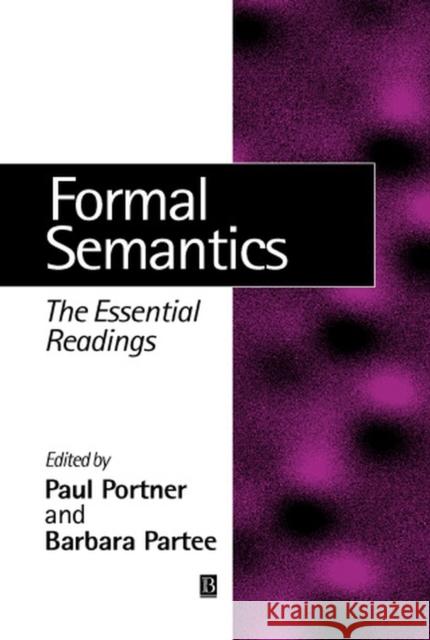


ISBN-13: 9780631215417 / Angielski / Twarda / 2002 / 496 str.
ISBN-13: 9780631215417 / Angielski / Twarda / 2002 / 496 str.
Formal Semantics: The Essential Readings is a collection of seminal papers that have shaped the field of formal semantics in linguistics.
"This volume contains a well–balanced selection of great papers covering fifteen vibrant years of semantic research. My own definition of a classic paper is a paper that is endlessly borrowed by students, but rarely returned. The papers in this volume all share the property that somewhere in the world somebody owns my copy of them. It′s great to find them all collected here."
Fred Landman, Tel Aviv University
"Truth–conditional semantics has its roots in the work of Frege and analytic philosophy, which was designed to overcome the vagueness, ambiguities, and dubious ontological commitments of natural language. Curiously, this intellectual tradition provided the very foundation for the serious study of meaning in natural language. This collection of seminal articles bears witness to this astonishing development; it should be essential reading for linguists and philosophers who are seriously interested in linguistic meaning." Manfred Krifka, Humboldt University
Acknowledgments.
Introduction (Paul Portner and Barbara Partee).
1. The Proper Treatment of Quantification in Ordinary English (Richard Montague).
2. A Unified Analysis of the English Bare Plural (Greg Carlson).
3. Generalized Quantifiers and Natural Language (Jon Barwise and Robin Cooper).
4. The Logical Analysis of Plurals and Mass Terms (Godehard Link).
5. Assertion (Robert C. Stalnaker).
6. Scorekeeping in a Language Game (David Lewis).
7. Adverbs of Quantification (David Lewis).
8. A Theory of Truth and Semantic Representation (Hans Kamp).
9. File Change Semantics and the Familiarity Theory of Definiteness (Irene Heim).
10. On the Projection Problem for Presuppositions (Irene Heim).
11. Toward a Semantic Analysis of Verb Aspect and the English ′Imperfective′ Progressive (David R. Dowty).
12. The National Category of Modality (Angelika Kratzer).
13. The Algebra of Events (Emmon Bach).
14. Generalized Conjunction and Type Ambiguity (Barbara Partee and Mats Rooth).
15. Noun Phrase Interpretation and Type Shifting Principles (Barbara H. Partee).
16. Syntax and Semantics of Questions (Lauri Karttunen).
17. Type–Shifting Rules and the Semantics of Interrogatives (Jeroen Groenendijk and Martin Stokhof).
18. On the Notion Affective in the Analysis of Negative–Polarity Items (William A. Ladusaw).
Index.
Paul Portner is Associate Professor of Linguistics and Acting Director of the Interdisciplinary Program in Cognitive Science at Georgetown University. He is the author of numerous articles on topics such as mood and modality, tense and aspect, and the syntax/semantics interface.
Barbara H. Partee is Distinguished University Professor of Linguistics and Philosophy at the University of Massachusetts, Amherst and is the author of several landmark essays in formal semantics. She has written and edited numerous books, including Mathematical Methods in Linguistics (with Alice ter Meulen and Robert Wall, 1990), Montague Grammar (edited, 1976), and Quantification in Natural Languages (edited, with Emmon Bach, Eloise Jelinek, and Angelika Kratzer, 1995).
The formal semantics approach to the study of natural language semantics was developed through active dialogue between linguistically minded philosophers and philosophically minded linguists and has become increasingly integrated into theoretical linguistics.
Formal Semantics: The Essential Readings is a collection of seminal papers that have shaped the field of formal semantics in linguistics.
The book covers key central themes and includes both an editorial introduction and extensive references. It is a vital resource for students and scholars of semantics and the philosophy of language.
Paul Portner is Associate Professor of Linguist... więcej >
1997-2026 DolnySlask.com Agencja Internetowa







